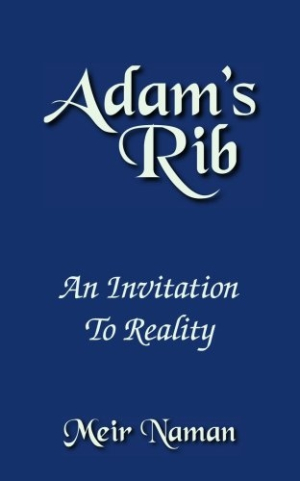Adam's Rib
An Invitation to Reality
Insightful observations on business, music, and language offer a philosophical perspective on the immigrant experience.
“Music was always a refuge for me. The most effective by far, ever since childhood,” songwriter and performer Meir Naman admits in his memoir, Adam’s Rib. The “good advice” and “pleasantness” he found in popular songs became a defense against peer hostility as a pubescent Jewish Iranian immigrant growing up in groovy Beverly Hills.
Like the songs Naman admires, his book contains elliptical lines wedged between descriptions of college life, employment in his family’s wholesale electronic exporting business, and his gradual maturation into middle age. Those experiences, in turn, inspired the author’s ruminations on trust, business, language, Hebrew philosophy, and women.
During the summer of 1979, the wealthy but worried Iranian parents of eleven-year-old Meir Naman send him and his siblings from politically turbulent Tehran to Los Angeles. Living under the care of his eighteen-year-old sister and twenty-one-year-old brother, Naman gradually adapted to life in the United States. Though he no longer lived in luxury, the author relished American conveniences but found himself “the bullies [sic] pick” at school.
By high school, Naman was a loner, his only solace rock ‘n’ roll, which was then rapidly evolving into New Wave. Adam’s Rib reveals the author’s evolution from a solitary youth into a sophisticated businessman whose travels included Europe and Latin America. “Native American presence and cultural influence are far more apparent and integrated within the Latin and the South Americas than in the USA,” he reminds readers.
Naman grapples with an attempt to know himself throughout the book and asserts that being a businessman became one of the best vehicles for self-discovery. “Commerce, with all of its pitfalls, does remain as the best way to experience the larger community,” Naman explains. “For that I remain grateful. For it is by the perspective of another that one can ponder self and fashion it according to one’s choosing.”
Another avenue toward self-discovery was romantic love. By the time Naman was thirty, he became infatuated with a young woman who taught him “kindness towards another.” Other romances followed, but none led to a permanent union. In a chapter titled “The Dance of Gender,” the author extols women but repeats the prefeminist idea that “women are generally more considerate of feelings and emotions, whereas men are generally more considerate of accomplishments.” If men stopped physically bullying women, he asserts, they would find them valuable allies. Naman’s subsequent description of entering middle age includes observations on the fleeting character of time, which he says “is all we have” and is the one meaningful gift we can give others.
Beyond the philosophical snippets that make Adam’s Rib a worthwhile book, readers may puzzle over Naman’s awkward prose, likely because English is not his native tongue. For example, the author writes, “the four of us in a two bedroom apartment; second floor,” and later, “the lack of luxury was compensated by abundance in availability.” Sprinkled throughout later pages of this well-designed book are other instances of interesting but muddled insight, including “fearless communication takes foundation from the understanding that all individuals are entitled to their privacy,” and “manifestly realizing that gravity is either a source of pressure or a source of support, in relation to the body.”
Adam’s Rib is a unique blend of interior dialogue and philosophy probably best appreciated as the lyrics of a popular song—initially puzzling, but as provocative as it is evocative of life’s vicissitudes.
Reviewed by
Nancy Rubin Stuart
Disclosure: This article is not an endorsement, but a review. The publisher of this book provided free copies of the book and paid a small fee to have their book reviewed by a professional reviewer. Foreword Reviews and Clarion Reviews make no guarantee that the publisher will receive a positive review. Foreword Magazine, Inc. is disclosing this in accordance with the Federal Trade Commission’s 16 CFR, Part 255.

